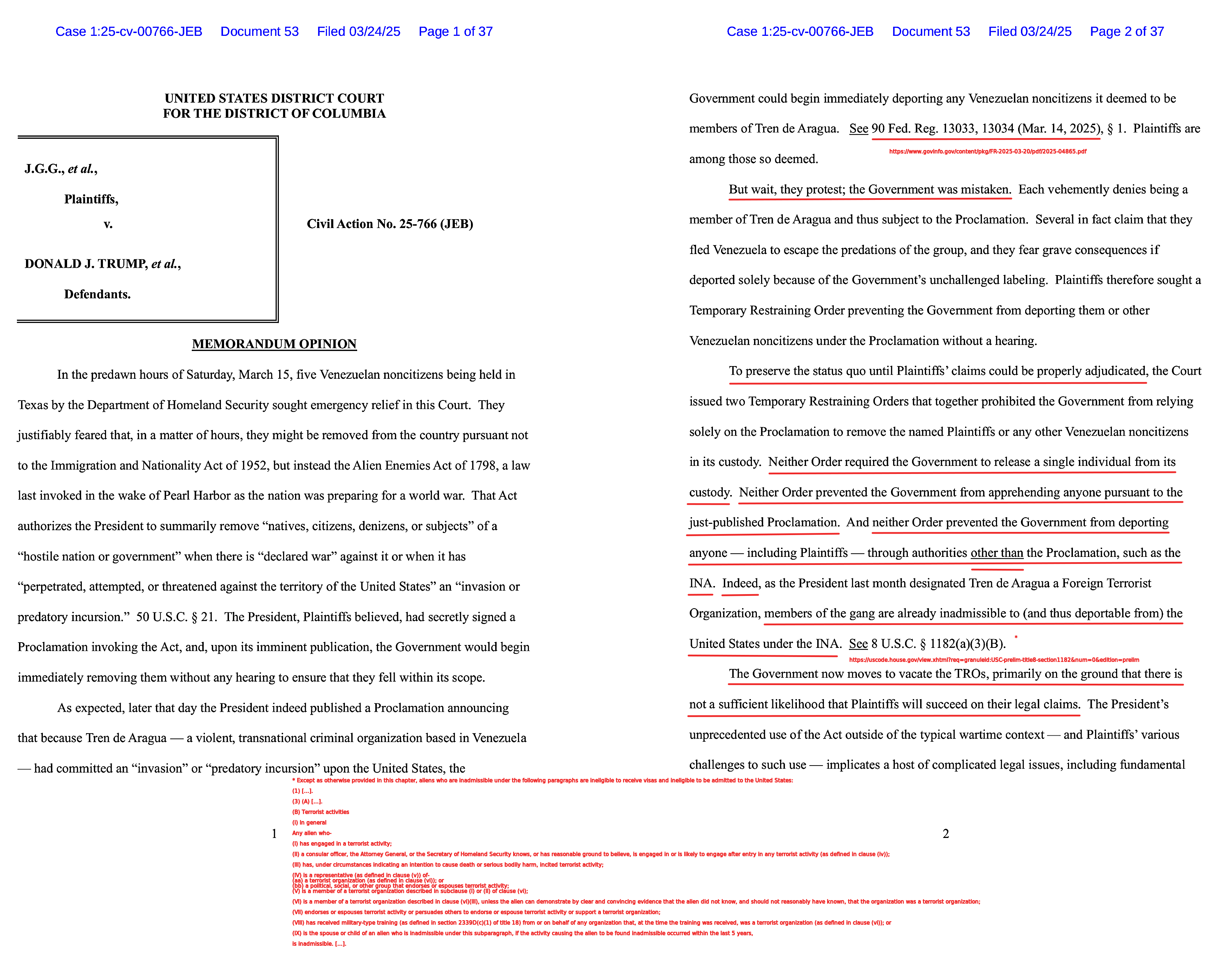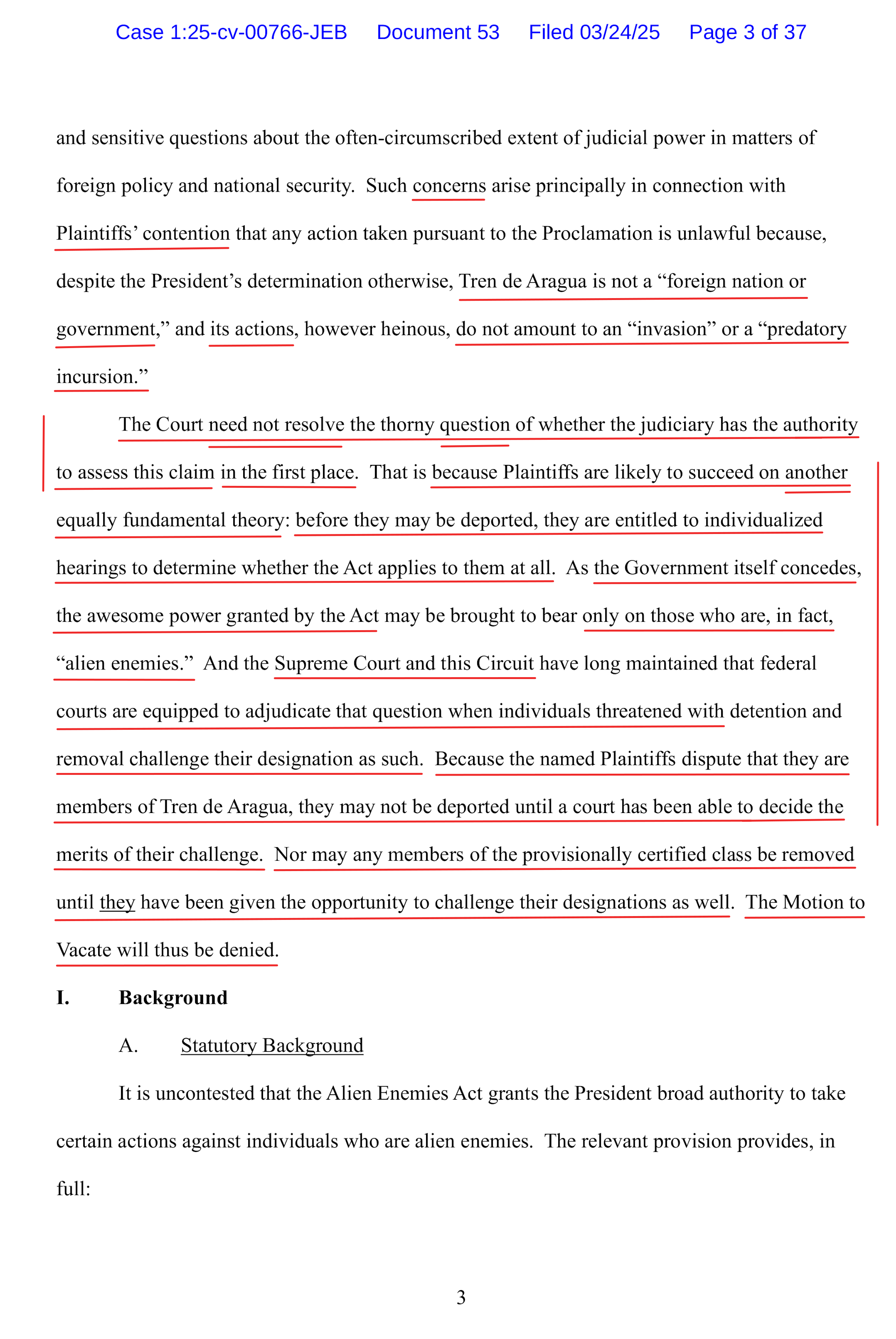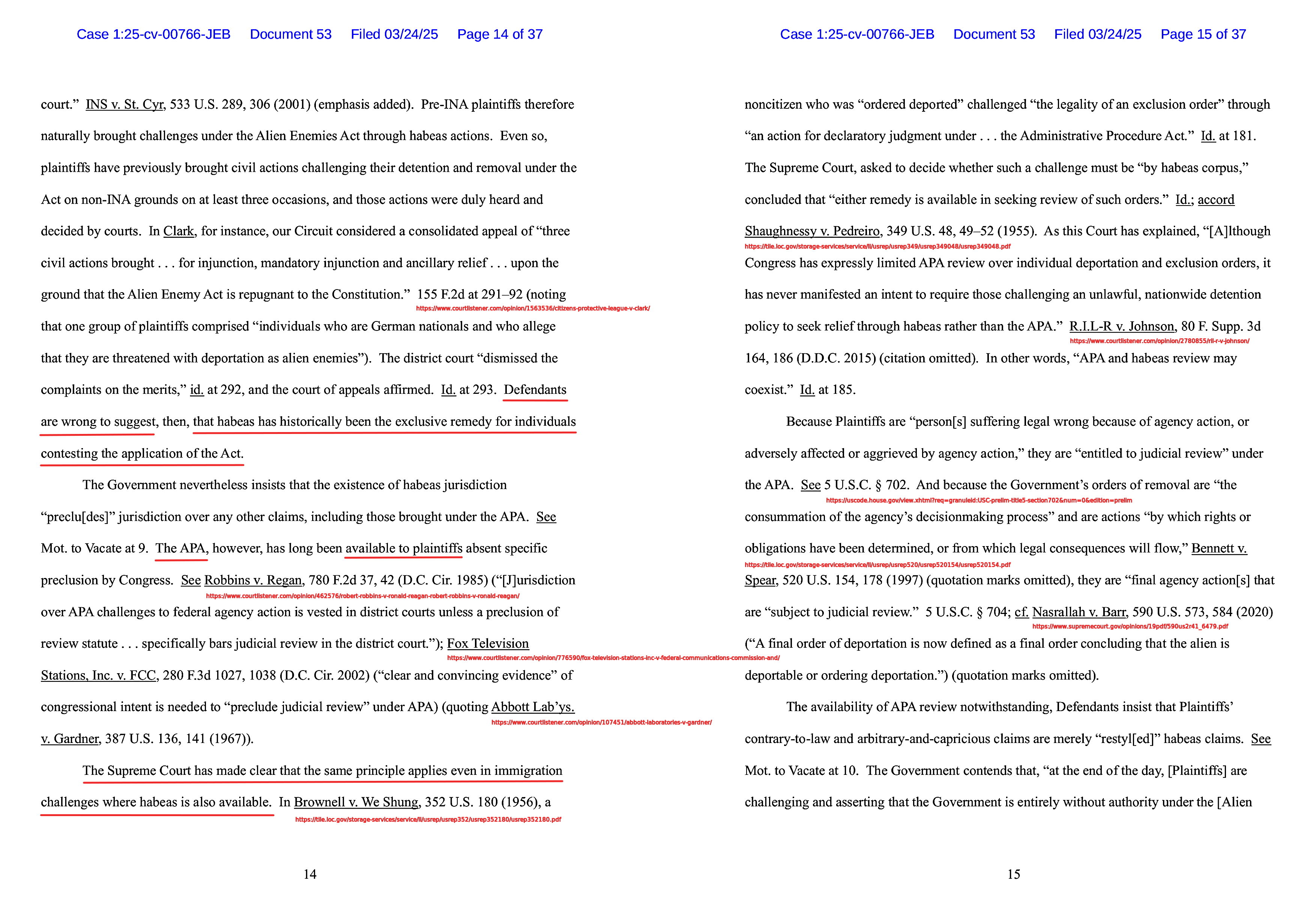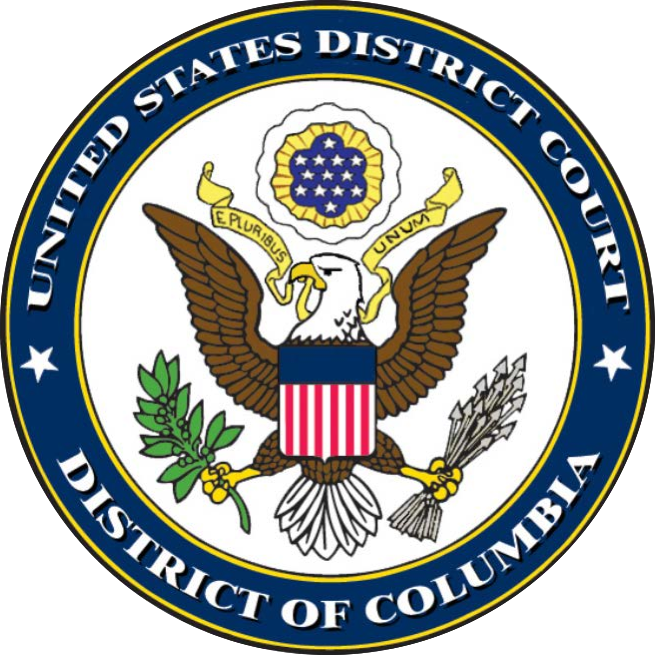Am Samstag, den 15.03.2025 veröffentlichte das Weiße Haus eine Proclamation, in der es heißt:
„I [President Trump] find and declare that TdA [Tren de Aragua] is perpetrating, attempting, and threatening an invasion or predatory incursion against the territory of the United States. TdA is undertaking hostile actions and conducting irregular warfare against the territory of the United States both directly and at the direction, clandestine or otherwise, of the Maduro regime in Venezuela.“
(https://www.whitehouse.gov/presidential-actions/2025/03/invocation-of-the-alien-enemies-act-regarding-the-invasion-of-the-united-states-by-tren-de-aragua/; vgl. taz-Blogs vom 16. und 17.03.)
Mit dieser Proklamation sollten Abschiebungen von Tren de Aragua-Mitglieder auf der Grundlage des Alien Enemies Act möglich werden. Noch am selben Tag untersagte der District Court für den District of Columbia – in Form einer Temporary Restraining Order (‚Eil-Eil-Rechtsschutz‘) – für 14 Tage Abschiebungen auf dieser Grundlage. Am Montag, den 17.03.2025 beantragte die Trump-Regierung bei dem erlassenden Gericht die Aufhebung der TRO; am Mittwoch, den 19.03. erwiderten die Betroffenen, die die TRO beantragt hatten (siehe taz-Blog vom 20.03.2025). Am Freitag, den 21.03. fand eine mündliche Verhandlung über den Regierungsantrag statt (siehe dazu Teil I, II, III und IV dieser Berichts-Serie).
Heute erging die Entscheidung – der Regierungsantrag wurde abgelehnt; die TRO von Samstag bleibt bestehen; die Antragsteller und Kläger haben bis Mittwoch Zeit, eine Verlängerung des Verbots durch Umwandlung der TRO in eine Preliminary Injunction (‚Eil-Rechtsschutz‘) zu beantragen:
„1) Defendants‘ 26 Motion to Vacate is DENIED; and 2) If Plaintiffs wish to convert the Temporary Restraining Order into a preliminary injunction, they shall so inform the Court by March 26, 2025.“
(https://www.courtlistener.com/docket/69741724/jgg-v-trump/?filed_after=&filed_before=&entry_gte=&entry_lte=&order_by=desc#entry-52; Hyperlink hinzugefügt)
Anders als für die ‚Eil-Eil-Entscheidung‘ von Samstag den 15.03.2025 gibt es diesmal eine ausführliche Begründung:


(https://storage.courtlistener.com/recap/gov.uscourts.dcd.278436/gov.uscourts.dcd.278436.53.0.pdf [37 Seiten])
8 U.S.C. § 1182 gibt es dort: https://uscode.house.gov/view.xhtml?req=granuleid:USC-prelim-title8-section1182&num=0&edition=prelim. Nach (3)(B)(i) geht es mit „(ii) Exception“ sowie in (iii) bis (vi) mit Begriffs-Definitionen weiter.
Die heutiger Entscheidung gliedert sich folgendermaßen:
Einleitung (S. 1 – 3 [ohne Überschrift])
- I. Background (S. 3 – 12)
-
- A. Statutory Background (S. 3 – 5)
- B. Factual and Procedural Background (S. 5 – 12)
- II. Legal Standard (S. 12)
- III. Analysis (S. 13 – 37)
- A. Jurisdiction (S. 13 – 18)
- B. Likelihood of Success on Merits (S. 19 – 33)
- 1. Lawfulness of Proclamation (S. 19 – 23)
- 2. Application of Proclamation to Plaintiff Class (S. 23 – 30)
- 3. Separate Statutory Restrictions on Removal (S. 30 – 33)
-
- C. Irreparable Harm (S. 33 – 35)
-
- D. Balance of Equities and Public Interest (S. 36 – 37)
- IV. Conclusion (S. 37)
Das aussichtsreichste Argument der Trump-Regierung für ihren Antrag lautete: Der District Court für den District Columbia sei für die Kläger und Antragsteller gar nicht zuständig. Denn sofern überhaupt eine gerichtliche Überprüfbarkeit gegegeben sei,
„it would be through habeas [siehe Teil II, FN 6] proceedings, see Ludecke v. Watkins, 335 U.S. 160 (1948) (considering challenge to action under AEA [Administrative Procedure Act] as habeas claim)—yet Plaintiffs voluntarily withdrew their habeas claims here. They had little choice, because habeas claims may be filed only in the district of confinement, see Rumsfeld v. Padilla, 542 U.S. 425, 435 (2004), and none of the Plaintiffs were detained in the District of Columbia.“
(https://storage.courtlistener.com/recap/gov.uscourts.dcd.278436/gov.uscourts.dcd.278436.26.0.pdf, S. 1 der gedruckten bzw. 9 der digitalen Seitenzählung – Hyperlinks hinzugefügt; ausführlicher S. 8 – 11 der gedruckten bzw. 16 – 19 der digitalen Seitenzählung)
Dazu schreibt der District Court in seiner heutigen Entscheidung:
„To be sure, judicial review of Alien Enemies Act claims has generally taken place in the context of a petition for a writ of habeas corpus. See, e.g., Ludecke v. Watkins, 335 U.S. 160, 163 (1948); United States ex rel. D’Esquiva v. Uhl, 137 F.2d 903, 904 (2d Cir. 1943); United States ex rel. Kessler v. Watkins, 163 F.2d 140, 140 (2d Cir. 1947); Bauer v. Watkins, 171 F.2d 494, 493 (2d Cir. 1948). But that fact is largely a relic of historical happenstance. In past invocations of the Act, those subject to removal were also detained solely on that basis.„
(https://storage.courtlistener.com/recap/gov.uscourts.dcd.278436/gov.uscourts.dcd.278436.53.0.pdf, S. 13; Hv. hinzugefügt)
Daraus folge aber nicht, daß ein habeas corpus-Antrag der einzige zur Verfügung stehende Rechtsbehelf ist (hier waren die Kläger und Antragsteller schon vor der Tren de Aragua-/Alien Enemies Act-Proklamation inhaftiert).
„Defendants are wrong to suggest […] that habeas has historically been the exclusive remedy for individuals contesting the application of the Act.“
(ebd., S. 14)

„In characterizing Plaintiffs’ arguments as ‚core habeas claim[s],‘ id. [Mar<arch> 21 Hearing Tr<anscript> <ist noch nicht veröffentlicht> at 18], however, Defendants ignore the unusual circumstances that gave rise to this suit. Plaintiffs represent a class of noncitizens who are both subject to the Proclamation and in Government custody pursuant to authorities independent from the Act. In other words, Plaintiffs had already been detained when the Proclamation was applied to them. They bring this action ’seek[ing] this Court’s intervention to temporarily restrain [the Government’s] summary removals.‘ Compl., ¶ 4; see also id. at 21 (requesting order “to stay [the Government’s] removals under the Proclamation”).
Plaintiffs’ challenge is accordingly centered on the legality of their removal under the Alien Enemies Act. Nowhere in their Complaint do they suggest that they are being unlawfully detained. Nor are they contesting the validity of their confinement or seeking to shorten its duration. Indeed, Plaintiffs have repeatedly emphasized throughout this litigation that they ‚do not seek release from custody.‘ Opp. at 20; see also Mar. 15 Hearing Tr. at 19.“
(https://storage.courtlistener.com/recap/gov.uscourts.dcd.278436/gov.uscourts.dcd.278436.53.0.pdf, S. 16; Hyperlinks hinzugefügt)
Was die Frage anbelangt, ob Gerichte befugt sind, zu überprüfen, ob Tren de Argua – wie die Regierung behauptet – unter „foreign nation or government“ und die Handlungen von Tren de Aragua unter „invasion or predatory incursion” fallen, so läßt das Gericht diese Frage zunächst einmal offen:
„The Government now moves to vacate the TROs, primarily on the ground that there is not a sufficient likelihood that Plaintiffs will succeed on their legal claims. The President’s unprecedented use of the Act outside of the typical wartime context — and Plaintiffs’ various challenges to such use — implicates a host of complicated legal issues, including fundamental and sensitive questions about the often-circumscribed extent of judicial power in matters of foreign policy and national security. Such concerns arise principally in connection with Plaintiffs’ contention that any action taken pursuant to the Proclamation is unlawful because, despite the President’s determination otherwise, Tren de Aragua is not a ‚foreign nation or government,‘ and its actions, however heinous, do not amount to an ‚invasion‘ or a ‚predatory incursion.‘
The Court need not resolve the thorny question of whether the judiciary has the authority to assess this claim in the first place.“„Given the broad powers the Executive possesses in national security and foreign affairs, this issue is a close call, and one the Court need not resolve today.“
(https://storage.courtlistener.com/recap/gov.uscourts.dcd.278436/gov.uscourts.dcd.278436.53.0_1.pdf, S. 3 und 19)
Aber das Gericht tendiert dahin, die fraglichen Begriffe zumindest einer juristischen Definition für zugänglich zu halten:
„In light of Ludecke and the political-question doctrine’s principles thus far explained, this Court is confident that it can — and therefore must, at the appropriate time — construe the terms ’nation,‘ ‚government,‘ ‚invasion,‘ and ‚predatory incursion.‘ Cf. Loper Bright Enters. v. Raimondo, 603 U.S. 369, 412 (2024). While doing so may be no light undertaking, it is a judicial one. A harder question is whether, based on those definitions, this or any court would be empowered to decide if the characteristics of Tren de Aragua qualify it as a ’nation‘ or ‚government,‘ or if its conduct constitutes a ‚perpetrated, attempted, or threatened‘ ‚invasion‘ or ‚predatory incursion.‘ 50 U.S.C. § 21.“
(ebd., S. 22)
Ausschlaggebend dafür, daß das Gericht die Wahrscheinlichkeit eines Erfolgs der Kläger und Antragsteller in der Hauptsache bejaht, ist im Moment Folgendes:
„Plaintiffs have established a likelihood of succeeding on a more discrete claim that justifies retaining the TROs even assuming arguendo that the Proclamation has a legal basis.“
„before they [Plaintiffs] may be deported, they are entitled to individualized hearings to determine whether the Act applies to them at all. As the Government itself concedes, the awesome power granted by the Act may be brought to bear only on those who are, in fact, ‚alien enemies.‘ And the Supreme Court and this Circuit have long maintained that federal courts are equipped to adjudicate that question when individuals threatened with detention and removal challenge their designation as such. Because the named Plaintiffs dispute that they are members of Tren de Aragua, they may not be deported until a court has been able to decide the merits of their challenge. Nor may any members of the provisionally certified class be removed until they have been given the opportunity to challenge their designations as well.“
(ebd., S. 23 und 3)
Dafür, daß den Klägern und Antragstellern „irreparable harm“ drohe (was – neben der Wahrscheinlichkeit eines Erfolgs in der Hauptsache – eine weitere Voraussetzung für den Erlaß einer TRO ist), stellt das Gericht nicht auf die Abschiebungen als solches, sondern auf die Haftbedingungen in El Salvador, wohin sie abgeschoben werden sollten, ab.
Diesem drohenden Schaden sei der Schaden, der der Regierung durch die TRO entsteht, nicht überwiegend:
„While the Government surely suffers harm whenever its removal orders are stymied, here such harms do not outweigh Plaintiffs’ need for preliminary relief. The Government, recall, is required only to abstain from removing the Plaintiff class from the United States solely on the basis of the Proclamation; in other words, removal under other statutes is permitted. Defendants point to no concrete problems that could attend that narrow restriction, instead alluding to vague foreign-policy and national-security concerns. See Mot. to Vacate at 23–24. That is insufficient.“
(ebd., S. 36; Hyperlink hinzugefügt)
Der heutige Erfolg der Kläger und Antragsteller wird vielleicht nur ein kurzzeitiger sein, denn im Moment verhandelt des Appeals Court über den Antrag der Regierung, die TRO des Districts Courts für die Dauer des appeal-Verfahrens außer Vollzug zu setzen – live stream: https://www.youtube.com/watch?v=4DoTLGECQSU.
PS.:
Roger Parloff von Lawfare fast die – inzwischen beendete – mündliche Verhandlung wie folgt zusammen:
„Hearing in Alien Enemies Act case just ended.
IMHO:
Judge Millett strongly tending toward keeping Boasberg’s TRO in effect.
Judge Walker tending *against.*
Judge Henderson asked no questions.“
(https://x.com/rparloff/status/1904253319486251042)
„To be clear, Judge Walker seemed to think the case should have been filed in the Southern District of Texas.“
(https://x.com/rparloff/status/1904253967594324246)
Luc Cohen and Ted Hesson, Nazis were treated better than Venezuelans deported by Trump, judge says at hearing
https://www.reuters.com/legal/judge-rejects-trump-administration-request-end-block-some-deportations-2025-03-24/ (March 24, 2025 11:22 PM GMT+1Updated 2 min ago)
Michael Kunzelman / Lindsay Whitehurst, Appeals court panel appears divided on Trump’s deportation of immigrants under wartime law
https://apnews.com/article/trump-judge-boasberg-venezuelan-immigrants-31217ce8ef990c9bd6ecb49654b6bf47 (Updated 9:57 PM GMT, March 24, 2025 )
Josh Gerstein / Hassan Ali Kanu, ‘Nazis got better treatment’: Appeals-court judge grills DOJ on swift deportation of Venezuelans. But a second judge was more sympathetic to DOJ’s arguments, while the third remained largely silent during a two-hour hearing.
https://www.politico.com/news/2025/03/24/trump-deportation-argument-dc-circuit-00246538 (03/24/2025 06:26 PM EDT)
Siehe vorab zur heutigen Appeals Court-Verhandlung:
Roger Parloff, The Upcoming Court of Appeals Argument in the Alien Enemies Act Case. The discussion will revolve around jurisdiction, not contempt
https://www.lawfaremedia.org/article/the-upcoming-court-of-appeals-argument-in-the-alien-enemies-act-case (Monday, March 24, 2025, 10:21 AM)



